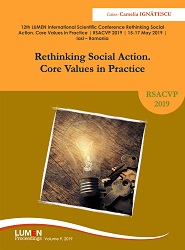Initial Construction and Validation of Parental Role Assuming Scale (PRA)
Initial Construction and Validation of Parental Role Assuming Scale (PRA)
Author(s): Maria-Laura Horeanu
Subject(s): Social Norms / Social Control
Published by: Editura Lumen, Asociatia Lumen
Keywords: parenthood; transition to parenthood; assuming parental roles; marital satisfaction; measurements;
Summary/Abstract: Parenthood is often viewed as a period with more changes in mother's life than fathers in terms of cultural aspects and society's assumption that mothers are the main sources of child care. At the same time, the roles of the family and the relationships between parteners have changed in Western societies, compared to the traditional model, in which father is being more involved in caring and educating children.Most of the studies that have been done, have construct, validated and/or used tools that measure the relationship between parent and child, but the approach to parental assuming, especially in the context of childbirth, has been neglected. The need to construct this instrument has come from the intention to analyze the extent to which the assuming of the parental role during the transition to parenthood influences marital satisfaction. So, in this study we constructed and validated the Parental Role Assuming (PRA) tool. Exploratory factorial analysis was performed to identify the parental component's factorial structure by using component analysis and varimax rotation. A structure of the construct tool model indicates three factors for the 13 items with a percentage of 59.49 of the total item variance.The validity of the convergent construct was obtained by significant correlations of the scale with the close items of the PCRI instrument [6]. Regarding the fidelity of the instrument, we obtained a total alpha cronbach of 0.81, and for the three subscale the internal consistency ranged from 0.80 to 0.70.
Book: Rethinking Social Action. Core Values in Practice
- Page Range: 141-151
- Page Count: 10
- Publication Year: 2019
- Language: English
- Content File-PDF

